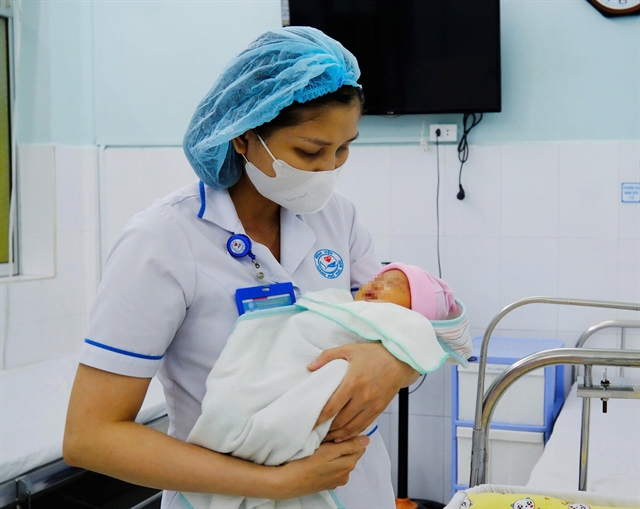 Society
Society

 |
| Thủ Đức Hospital in HCM City has successfully performed a complex emergency procedure to save a pregnant woman with severe heart disease during her fifth delivery. — Photo Courtesy of the hospital |
HCM CITY — Thủ Đức Hospital in HCM City has successfully performed a complex emergency procedure to save a pregnant woman with severe heart disease during her fifth delivery.
The case was handled effectively thanks to the coordinated efforts of multiple specialities and the hospital’s highly skilled medical team.
Previously, the hospital admitted H, a 34-year-old woman, who was 37 weeks pregnant, in labour while having acute respiratory failure.
Medical history revealed that the patient suffered from dilated cardiomyopathy with an ejection fraction (EF) of just 32 per cent, and had been diagnosed with hyperthyroidism since 2021, though without continuous treatment.
One month prior to admission, she had developed shortness of breath. Notably, the patient had not undergone regular prenatal check-ups or received any vaccinations during this pregnancy.
Recognising the high-risk nature of the case with multiple complicating factors including advanced heart failure, hyperthyroidism, anemia, and preeclampsia, the hospital's Board of Directors immediately convened an emergency multidisciplinary consultation.
The team included specialists in obstetrics, cardiac intensive care, anesthesiology and resuscitation, neonatal intensive care, and endocrinology.
Thanks to a highly synchronised multidisciplinary approach that made optimal use of the critical golden hour, the surgical team completed a successful cesarean section just 45 minutes after the patient was admitted.
A healthy baby girl weighing 2.7kg was delivered, with APGAR scores of 8 and 9.
Following surgery, the mother was transferred to the Cardiac Intensive Care Unit for continued monitoring and treatment of her severe heart condition.
Within 24 hours, her hemodynamic and blood oxygen levels improved significantly, allowing doctors to successfully remove the endotracheal tube.
By the third day, the patient had fully stabilised and was discharged a few days later in good health, fully conscious and breathing normally.
Dr. Phạm Thị Duyên, deputy head of the Cardiac ICU, said that with a heart function of only 32 per cent, every uterine contraction posed a serious threat to the mother’s life.
“Without timely intervention, the patient could have faced life-threatening complications such as acute pulmonary edema, hypoxemia, or arrhythmias – all of which endanger both mother and baby,” she said.
The success of this emergency case stemmed from the close coordination between doctors in making prompt decisions and developing a comprehensive treatment plan.
The obstetrics team proceeded with timely surgical delivery; anesthesiology managed hemodynamic stability; cardiac ICU handled post-operative care; endocrinology regulated thyroid hormone levels; and the neonatal team was on standby to receive the newborn.
“In complex cases like this, survival often depends on rapid, precise, and well-coordinated intervention at the right moment.”
With the support of a modern electronic medical records system, the medical team was able to quickly access the patient’s medical history, enabling timely and accurate diagnosis and treatment.
Based on this case, doctors strongly advise pregnant women with heart conditions to do regular prenatal check-ups and maintain close monitoring with specialised physicians.
In addition, choosing a healthcare facility equipped with adequate resuscitation capabilities and consulting with doctors on appropriate family planning are vital considerations.
This successful emergency case highlights the effectiveness of the multidisciplinary hospital model. The combination of an experienced medical team and a modern information management system played a crucial role in achieving the best possible outcome for the patient. — VNS




